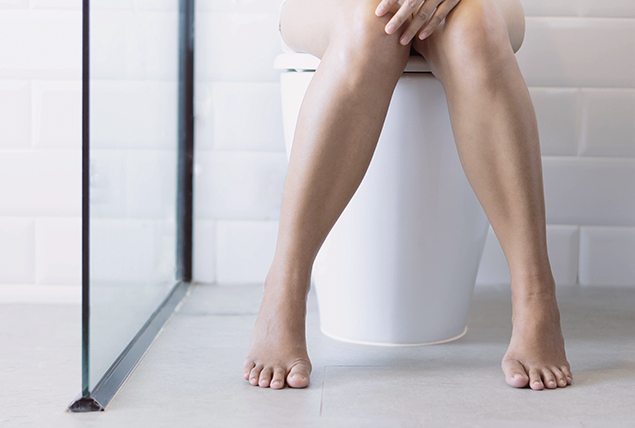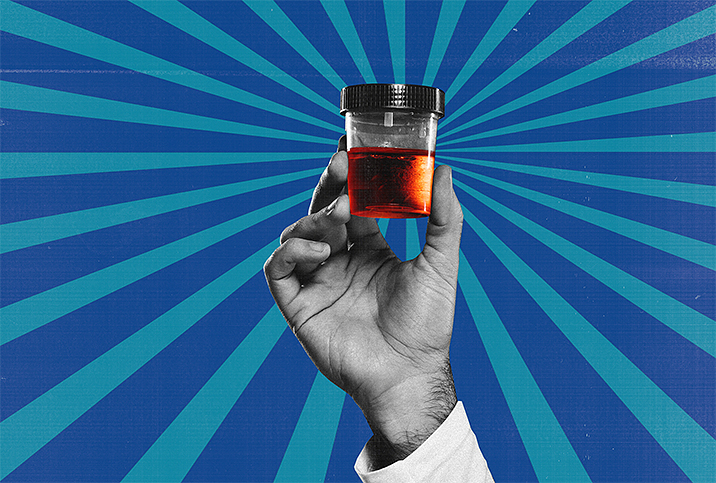What Do Nitrites in Urine Mean?

Nitrites and nitrates are compounds containing nitrogen and oxygen. These naturally occurring chemicals are commonly found in soil, water, air and good-for-you foods such as raw spinach, lettuce and carrots.
But there's one area where nitrites shouldn't be found in abundance: your urine.
The presence of nitrites in urine
Healthy urine contains nitrates. When bacteria invade your body through the urinary tract, they turn nitrates into nitrites, according to Cleveland Clinic.
"Nitrites develop when certain bacteria enter the lower urinary tract and change the nitrates in urine," said Aleece Fosnight, M.S.P.A.S., a physician's assistant in North Carolina and medical advisor for Aeroflow Urology.
If your urine has nitrites (nitrituria), you may experience certain symptoms and need to take a test to confirm the diagnosis.
"Nitrites are found in the urine when a medical facility runs a urinalysis—dipstick or machine—that detects the presence of nitrites," Fosnight explained.
Reasons for testing
Your doctor may request a urinalysis if you show signs of an infection or you present with any of the following symptoms:
- Pain or burning when urinating
- Cloudy or dark urine
- Delirium, particularly in older people
- Strong odor
- Frequent urination
- Blood in your urine
- Pelvic pain or discomfort
Any of these symptoms can be cause for concern. These symptoms could indicate a urinary tract infection (UTI) or other health complications. Schedule a doctor's appointment for a urinalysis. You can sometimes receive same-day results.
What causes a UTI?
"UTIs are caused by bacteria entering the urinary tract and multiplying," explained Jamin Brahmbhatt, M.D., urologist and robotic surgeon at Orlando Health in Clermont, Florida.
Urinary tract infections can be caused by several different factors. The pathogens to blame for a UTI include Escherichia coli, Klebsiella pneumoniae, Proteus mirabilis, Enterococcus faecalis and Staphylococcus saprophyticus. Fungi can cause a urinary tract infection, though bacteria are the usual culprit.
Causes of a UTI can include:
- Sex
- Not fully emptying the bladder
- Uncontrolled diabetes
- Wiping back to front (in women)
- Birth control
- Dehydration
- Holding it in
- Kidney stones
Women are 30 times more likely to get a UTI. Research suggests 50 percent to 60 percent of women get a UTI in their lifetime. Why? A woman's urethra is shorter than a man's, which makes it easier for bacteria to enter the bladder and cause an infection.
Pregnant women are more likely to develop UTIs due to changes in the bacteria in the urinary tract and not fully emptying the bladder. Additionally, postmenopausal women are at risk because of a lack of estrogen, pelvic prolapse and the loss of healthy bacteria in the vaginal flora.
Some other potential causes are kidney stones, dehydration and constipation, Fosnight said. To prevent the occurrence of UTIs, she recommended staying hydrated, practicing good hygiene, utilizing localized hormone therapy, trying to prevent kidney stones and avoiding constipation by getting enough fiber.
How is a UTI treated?
UTIs are typically treated with oral antibiotics, Brahmbhatt said.
"The specific antibiotic used depends on the type of bacteria causing the infection. A urine culture is often done to help diagnose what bacteria is causing the UTI and what antibiotic can be used to treat the infection," Brahmbhatt said.
However, if UTI symptoms worsen or you show signs of a fever or sepsis, intramuscular (IM) or intravenous (IV) antibiotics may be required, Fosnight explained.
Are there complications if a UTI is left untreated?
Never ignore the symptoms of a urinary tract infection.
"If a UTI is not caught in time, the bacteria can travel to the kidney, leading to a kidney infection, or pyelonephritis, which could then lead to sepsis or a blood infection, which can be life-threatening," Fosnight warned.
"A kidney infection can scar the kidney and potentially lead to kidney failure in the future," Fosnight continued. "Occasionally, if there is a plethora of bacteria in the bladder, this can irritate the GAG layer, or protective protein layer, of the bladder to the point of damaging it, which can cause enough trauma leading to incontinence either during the infection and/or afterward the infection has been healed."
An untreated UTI can interfere with daily activities. You may feel discomfort when exercising, having sex or urinating. Visit your doctor as soon as you experience signs of a UTI. Don't try to self-treat at home. Your symptoms may rapidly worsen and lead to extreme discomfort.
Other causes of nitrites in urine
Nitrites in your urine aren't always a sign of a UTI. Other than bacteria, medications (such as nitrofurantoin and phenazopyridine) and bladder catheterizations can result in the presence of nitrites in urine, Brahmbhatt said.
Fosnight explained that false-positive readings for nitrites in urine are common and can be caused by certain dyes in foods or antiseptics in OTC medications. Additionally, a faulty urinalysis dipstick or an improperly calibrated machine could give a false reading.
In cases like these, further testing is recommended to confirm the cause of nitrites in urine.
The bottom line
Nitrites don't typically belong in urine. Unless you have had specific medications or a bladder catheter, nitrites are a sign of a UTI. Over-the-counter remedies can stop the pain, not the problem. Visit your doctor to schedule a test and receive the proper treatment to clear your urinary tract infection, and take steps to help prevent a UTI.
If you don't have a healthcare professional, Giddy Telehealth offers a convenient online portal. Browse hundreds of doctors. Many offer video consultations or same-day appointments

















